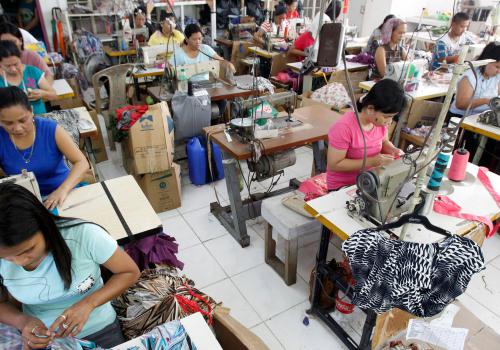Philippine garment exporters expect to cut around 21,000 jobs this year as orders from the U.S. plunge, prompting workers to call on international brands, including Adidas and Under Armour, to help avert further layoffs.
The mass layoffs come as the local labor market is already in turmoil from lengthy coronavirus-related lockdowns. Adding to pressure on the garment sector, talks on a U.S.-Philippines free trade agreement intended to rejuvenate exports have also stalled.
The estimated job cuts are based on an industry survey and are equal to a fifth of the 112,000 workers employed by member-companies of the Confederation of Wearables Exporters of the Philippines, or Conwep, which produce clothes, bags and shoes for major global brands.
"What you're seeing is a direct impact of the pandemic," Conwep executive director Maritess Agoncillo said in an interview on Monday. "The orders are not coming in anymore."
Major contactors based in the central island of Cebu have already laid off over 4,000 workers early this month and more job cuts loom, according to Dennis Derige, a coordinator for the Mactan Export Processing Zone Workers Alliance, whose members include retrenched garments workers.
Derige is appealing to international brands supplied by the contractor, including Adidas, Under Armour and Lululemon Athletica, to help avoid further job cuts.
"This crisis is temporary, but layoff is permanent. We hope they advise their sub-contractors to put the layoff on hold. They are the buyers, they have a big say in this," Derige told the Nikkei Asian Review on Monday.
Cebu-based Sports City International Philippines said it was forced to retrench 4,420 out of its 18,436 staff to ensure its business survival.
"Our business and that of our buyers and customers worldwide have been gravely affected [by the pandemic] considering that our products are classified as non-essential and luxury items," Sports City said in a statement on Tuesday, without identifying its clients.
A spokesperson for Adidas did not comment on the specific situation at Sports City but said "fair labor practices, fair wages, and safe working conditions" are mandatory for all Adidas suppliers.
Under Armour and Lululemon have yet to comment.
Agoncillo declined to name Conwep's clients but said her members have struggled from weak demand from the U.S., which makes up around 75% of orders.
Apparel exports fell 49% to $192 million from January to May this year, she said.
"By this time, we should be receiving orders for spring [next year] but there are no orders," Agoncillo said, adding that manufacturers are only downsizing, not closing.
The layoffs are expected to deal a blow to the local job market. The Philippines' unemployment rate eased to 10% in July, from a record 17.7% during the height of the lockdown in April, but that is still double from 5.4% a year ago.
The Philippine government has been eager to revive its garments sector -- a major industry in the 1990s until an export quota was phased out -- through an FTA with the U.S. Talks for the agreement, however, have faced delays.
"We may need an aggressive approach to our market access issues, rekindle the U.S.-Philippines FTA agenda and the enhancement of the EU GSP+ [Generalized System of Preference] program," Agoncillo said.
The GSP in principle removes tariffs on imports into the European Union from developing countries.
